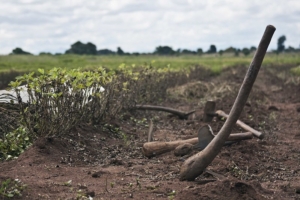Empowering Malawian Farmers: AI-Driven Agricultural Solutions


The Need for Innovation in Malawian Agriculture
Unpredictable weather patterns, limited resources and a lack of timely access to agricultural expertise deeply impact agriculture in Malawi. The country’s farmers often face issues such as crop diseases, pest infestations and the devastation of climate disasters like Cyclone Freddy, which displaced more than 100,000 people in 2023. The loss of crops, including the crucial soy harvest, left farmers struggling to recover.
In this context, Opportunity International, a Chicago-based nonprofit, saw an opportunity to use AI to offer farmers practical solutions. Ulangizi, the app it developed, connects farmers directly to expert advice, offering them the guidance they need to manage everyday challenges and the unpredictable effects of climate instability.
AI at the Service of Farmers
Ulangizi functions through WhatsApp, a platform already popular in many parts of the world, including Malawi. This accessibility allows farmers to interact with the app through simple messages and receive tailored advice in their native language. The app uses AI tools, including data from ChatGPT and the Malawian government’s agricultural manual, to diagnose crop and livestock problems and suggest solutions.
For example, farmers can take a photo of a sick plant or animal, send it via WhatsApp and receive immediate feedback on the issue and how to address it. In one instance, a Malawian farmer used Ulangizi to identify and treat a health issue with her pigs, preventing further losses. This quick response is invaluable, as traditionally, farmers had to wait days or even weeks, for government agricultural extension workers to visit.
Addressing the Challenges of Rural Connectivity
While Ulangizi is empowering Malawian farmers, it also faces several challenges. In many rural areas, such as Ndodo, smartphones are scarce, with one device sometimes shared among 150 people. Connectivity can also be a significant barrier, as mobile network coverage in these areas is limited and data costs remain prohibitive for many farmers.
However, the nonprofit has designed Ulangizi to work on basic phones, ensuring that even those without access to advanced smartphones can benefit from the service. Opportunity International is also working to overcome these connectivity challenges by collaborating with local networks to improve access to affordable data.
Building Resilience
Malawi’s smallholder farmers are particularly vulnerable to climate-related disasters. In addition to cyclone damage, farmers often face erratic rainfall, droughts and soil degradation. Ulangizi helps farmers build resilience by providing knowledge on better agricultural practices, pest control and disease prevention.
With Ulangizi, farmers can make informed decisions about when to plant, what crops to grow and how to manage soil health. By increasing access to this knowledge, the app empowers farmers to improve yields, reduce losses and ultimately increase their income, making agriculture a more sustainable and reliable livelihood.
A Global Model for Smallholder Farmers
The success of Ulangizi in Malawi has caught the attention of other countries in sub-Saharan Africa, where smallholder farmers face similar challenges. Opportunity International plans to expand the app’s reach, building on the feedback collected during its pilot phase.
Globally, smallholder farmers produce a significant portion of the world’s food. Yet, they often yield far less than their potential due to limited access to resources, knowledge and technology. Ulangizi’s AI-powered approach could help bridge this gap, improving productivity and contributing to global food security.
– Georgia de Gidlow
Georgia is based in Watford, UK and focuses on Technology and Solutions for The Borgen Project.
Photo: Flickr
